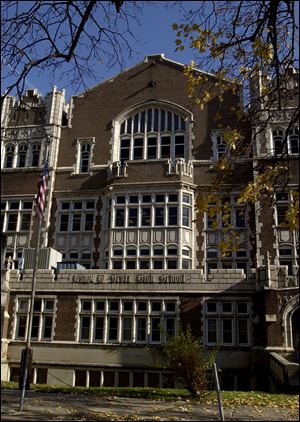
U.S. gives $6M to TPS for 4 schools
Improvement could win $11M in following years
8/10/2011
Scott High School will share in $6 million in federal School Improvement Grants to TPS this year. The Glenwood, Pickett, and Robinson K-8 schools are the others.
Millions in federal dollars will be pumped into some of the lowest-performing Toledo schools this year after the district was awarded several grants to aid reform.
District officials announced Tuesday that Toledo Public Schools was awarded about $6 million in School Improvement Grants this year to be spent at Scott High School and K-8 schools Pickett, Glenwood, and Robinson. The schools are eligible for similar grants the next two years if they reach required improvement benchmarks, said Jim Gault, Toledo's interim chief academic officer. That means the district could ultimately be awarded more than $17 million for those schools.
"With these dollars," Mr. Gault said, "comes accountability."
The schools were eligible for the grants because they are high-poverty, low-achieving schools. Funding for School Improvement Grants was boosted in 2009 by the federal stimulus bill, though the Obama Administration also tied the funding to reform requirements for low-performing schools. The grant funding is dedicated to the reform programs, and can't be shifted into the district's general fund or go to things such as pay raises.
And though the new funding could ultimately be more than the district received through the federal Race to the Top program, district officials said it doesn't eliminate long-term fiscal needs that will likely lead to a future levy request.
"We have been very aggressive trying to find ways to obtain dollars for the school district for things that we have a dire need for," Superintendent Jerome Pecko said. "But by no means does that resolve the problems that we have down the road."
The funding will be used to extend the school day at Glenwood and the school year at the other schools. New staff will be hired, including parent coordinators at each school. And new collaborations between the schools and community groups will be developed.
Each of the schools has its own reform plan under either a turnaround model, which involves staff overhauls, or a transformation model, which requires major program changes.
Scott High, for instance, will abandon the small-school model used in recent years for a more traditional general education design. Additional staff include a data coordinator, a social worker, and a part-time art and music therapist.
The school will use a college readiness program also being developed at Woodward High School through the help of a different, $61,000 federal grant. The program, called Advancement Via Individual Determination, increases the opportunity for students with average academic performance to take advanced courses.
Glenwood, a former elementary school that will now become K-8, will expand its school day by 75 minutes. It and the other three schools will also add a -- for now -- voluntary six-week summer camp at the end of this school year; will offer after-school tutoring and enrichment activities, and will start the 2012 school year a week early.
The three K-8 schools will have reading and math coaches, social workers, a full-time nurse, teachers focusing on early intervention, and, maybe most importantly, Mr. Gault said, part-time parent coordinators. They will serve as bridges between school and families.
New Glenwood Principal Jennifer Spoores, who previously led Old Orchard Elementary, said the changes should increase parent and community involvement in the schools. "I think they will be excited for the changes that they see," Ms. Spoores said.
The schools will use the social and emotional learning program, which focuses on such things as student behavior, school climate, and parental approaches to improve academic performance. That program is in use at two TPS schools, including Sherman Elementary, and is credited at least in part with academic progress at those schools.
They will use a reading initiative called RAISE -- Reading Academy Intensive Support Education -- a third-grade reading program in use at five district schools and expected to produce significant test-score gains.
Robinson, which was a middle school, will see the most drastic changes. Its entire staff was removed, and hiring will be done by the school, not the district, in a departure from traditional TPS practice. Only a lead teacher and new principal Anthony Bronaugh -- who previously led Sherman -- were hired by the district.
The four schools will be pilot schools for the district in a performance pay model developed by the Ohio Department of Education. The model uses student academic progress as part of the determination of teacher pay levels, instead of the traditional automatic longevity pay raises.
Teachers at all four schools will get extensive, mandatory professional development. And the schools will be held accountable, Mr. Gault said, because future funding requires they meet benchmarks in areas such as academics, attendance, and behavioral incidents.
Contact Nolan Rosenkrans at: nrosenkrans@theblade.com or 419-724-6086.